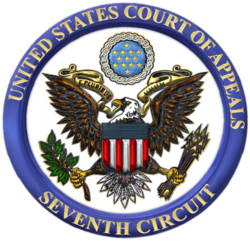 The U.S. Court of Appeals for the Seventh Circuit recently affirmed summary judgment in favor of a debt collector, holding among other things that the “FDCPA is not an enforcement mechanism for matters governed elsewhere by state and federal law.”
The U.S. Court of Appeals for the Seventh Circuit recently affirmed summary judgment in favor of a debt collector, holding among other things that the “FDCPA is not an enforcement mechanism for matters governed elsewhere by state and federal law.”
A copy of the opinion is available at: Link to Opinion.
The plaintiff failed to pay his credit card and a law firm specializing in debt collection sued to collect the balance in state court. In response to the creditor’s motion for summary judgment, the card holder invoked the arbitration provision in the credit card agreement.
The state court denied the creditor’s motion for summary judgment and stayed the case for 30 days to allow the card holder to commence arbitration. The order also provided that if this was not done, the stay would be dissolved automatically.
The deadline passed without arbitration being commenced, in part because the American Arbitration Association declined to accept the case because the creditor had previously failed to comply with its policies governing consumer claims. The creditor then filed a second motion for summary judgment, to which the debtor responded with a motion to dismiss or continue the stay. The state court denied the motion to dismiss, but enlarged the time to arbitrate by three months.
In the interim, the debtor sued the creditor’s law firm in federal district court, arguing that the second motion for summary judgment, filed after the debtor had elected to proceed with arbitration, was an unfair or unconscionable means of attempting to collect the debt in violation of the FDCPA, 15 U.S.C. § 1692f.
In addition, the debtor argued that the law firm violated 15 U.S.C. § 1692e by supposedly misrepresenting the amount of interest in the state court complaint as 10.65% instead of the 13.9% reflected in a later statement the debtor received.
The district court granted summary judgment in the debt collector’s favor and the debtor appealed.
On appeal, the Seventh Circuit noted that, under 15 U.S.C. § 1692f, “[a] debt collector may not use unfair or unconscionable means to collect or attempt to collect any debt.” The Court noted that while “the statute does not define the phrase ‘unfair or unconscionable,’ and we have called the phrase ‘as vague as they come,’ … the statute provides a list of eight illustrative violations.”
State Judicial Proceedings Outside Scope of § 1692f
The Seventh Circuit further noted that subsection 1692f(6) was the most relevant to the case at bar, which prohibits “taking or threatening to take any nonjudicial action to effect dispossession or disablement of property,” which implies “that state judicial proceedings are outside the scope of § 1692f.”
The Seventh Circuit held that “[i]f state judicial proceedings are outside the scope of§ 1692f, then [plaintiff] does not have a leg to stand on.” Although the Court thus expressed doubt “that a state court motion for summary judgment — filed to collect an overdue credit card debt — could qualify as an unfair or unconscionable act under the FDCPA,” it decided to “look to the facts of this particular case before we pass judgment on [plaintiff’s] claim.”
The Seventh Circuit disagreed that filing the second motion for summary judgment after the debtor had elected arbitration violated § 1692f of the FDCPA, reasoning the “FDCPA is not an enforcement mechanism for matters governed elsewhere by state and federal law.”
The Court pointed out that the debtor “seeks to transform the FDCPA into an enforcement mechanism for the arbitration provision in his credit card agreement,” and that it had previously rejected such an approach in its decision in Beler v. Blatt, Hasenmiller, Leibsker & Moore, LLC, 480 F.3d 470 (7th Circuit 2007).
In Beler, the plaintiff alleged that a debt collector law firm violated § 1692f of the FDCPA by trying to levy on Social Security benefits, which are exempt from execution or attachment under federal and state laws. The Court denied the claim because “both the federal and state laws implicated provided remedies for violations.”
Collector Acted Consistently with State Court Order
Finding that the debt collector acted consistently with the state court order setting a time limit to initiate arbitration, the Court concluded that filing the second motion for summary judgment was not “an unfair or unconscionable means of attempting to collect a debt under § 1692f.”
Turning to the interest rate claim, the Court rejected the debtor’s “either-or” argument that “either (1) [the debt collector] misrepresented the interest rate when it alleged 10.65% in its complaint, in violation of 15 U.S.C. § 1692e; or (2) [the debt collector] attempted to collect a debt not authorized by the agreement, in violation of 15 U.S.C. § 1692f(1).”
The Court noted that the debtor offered no evidence that the debt collector misrepresented the interest rate or attempted to collect a debt not authorized by the agreement in response to the debt collector’s motion for summary judgment. Accordingly, the Court found that “the district court properly granted summary judgment in favor of [the debt collector].”
The Seventh Circuit also rejected the debtor’s final argument that, by assuming the card issuer’s reduction of the interest rate from 13.9% to 10.65% was proper, the district court improperly drew an adverse inference against the non-moving party, reasoning that the card issuer was not a party to the lawsuit and that the inquiry at hand was the representations and collection efforts of the debt collector.
Because the debtor failed to raise a triable issue that the law firm “either misrepresented the interest rate or attempted to collect an amount not authorized by the agreement with [the card issuer],” the district court’s judgment was affirmed.

